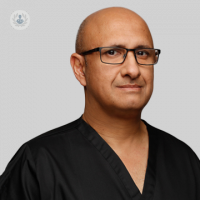A guide to anal fistulas
Written by:Anal fistulas are painful tunnels running from within the anal passage to an opening on the skin outside. In his latest article, consultant colorectal surgeon Mr Tushar Agarwal shares his expert insight into the condition.

What is an anal fistula?
Anal fistulas are abnormal communication from an opening inside the rectum to an opening on the skin. There is a tract joining the two openings together.
How do they form?
In the majority of cases, we don’t know why they form. Some people have underlying conditions such as Crohn’s disease that can make them more susceptible to getting an anal fistula.
In the majority of cases, fistulas form following the appearance of an abscess.
Can they be prevented?
Unfortunately, fistulas cannot really be prevented. They form and must be treated, and there is not much you can do to stop them from happening.
How are fistulas diagnosed?
The diagnosis is usually made clinically. After a clinical examination, you can have a fairly good idea if it is a fistula or not. The next investigation is an MRI scan. This not only confirms the fistula but can give us an idea of what type of fistula you have. It could be a low fistula or a high fistula, and these are treated differently.

What does an anal fistula treatment entail? When is surgery required?
If the fistula is symptomatic, then it needs to be treated. There are no medicines that will treat a fistula, so surgery is required. There are various surgical options depending on the type of fistula. Surgery usually involves opening up the fistula, and sometimes a stitch around it.
There are new techniques that have been introduced recently, which involve laser treatments. There are also more complex procedures, such as flaps or suturing of the fistula tract. The treatment depends on the type of fistula ascertained by a clinical examination and an MRI scan.
Mr Tushar Agarwal is a leading consultant colorectal surgeon based in London, with over 30 years of experience. If you would like to book an appointment with Mr Agarwal, you can do so today via his Top Doctors profile.


